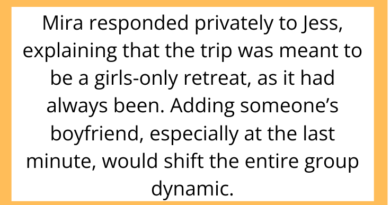AITAH for Not Helping My Mom Financially After She Paid for My Brother’s Destination Wedding?
Family finances are messy enough but when favoritism, double standards, and major life events get thrown into the mix, things can explode. This r/AITAH post has Reddit split: is the original poster a selfish child, or just tired of always being second place?
Let’s unpack a story of weddings, wallets, and one adult child finally saying, “Enough.”
OP, a 27-year-old woman, starts her post by laying it all out: she’s been financially independent since she graduated college. Rent, bills, groceries—she’s handled everything on her own. Meanwhile, her younger brother, 24, has been getting major help from their mom. We’re talking rent paid, car insurance covered, and even a “small loan” here and there for concert tickets and travel.
But the real breaking point came this year when their mom paid for the entire destination wedding for her brother and his fiancée.
We’re not just talking about contributing a little toward catering. No, OP says her mom covered airfare for both families, a luxury beach resort, the ceremony, the reception, and even the bridal party’s outfits. The price tag? Over $40,000.
A Surprise Ask

A few months later, OP gets a call from her mom.
She’s struggling financially. Turns out, the wedding expenses were more than she could handle, and now she’s behind on mortgage payments. She asked OP for “a little help”—about $3,000 to get back on track.
OP declined. Not because she didn’t have the money (she did), but because she was hurt and fed up. She calmly explained to her mom that she felt taken for granted, especially since she’s never received that kind of support—even when she really could’ve used it.
Her mom burst into tears, accused OP of being cold-hearted, and said, “I did what I could for your brother because he needed it. But you’re better off—why wouldn’t you want to help your own mother?”
Since then, OP’s extended family has been blowing up her phone. One aunt even said she’s “turning her back on the woman who raised her,” and that “a good daughter doesn’t keep score.”
So OP asked Reddit: AITAH for not helping my mom financially after she drained her money paying for my brother’s wedding?
Let’s Break It Down: Is OP Actually the Villain Here?

This isn’t just about money. It’s about emotional equity what people give, what they get, and what’s expected of them based on unspoken family roles.
1. Financial Fairness and Favoritism
OP wasn’t mad about not getting help until her mom turned around and gave massive financial support to her brother.
This type of imbalance often builds resentment over time. It’s not just about who gets more; it’s about who gets acknowledged, who feels supported, and who’s expected to “be fine” because they’re the responsible one.
The term parentification comes to mind— where one child is emotionally or financially expected to be the “grown-up,” even when they shouldn’t have to carry that weight.
2. Helping vs. Enabling
There’s a difference between helping someone in a time of need… and cleaning up after their poor financial decisions.
OP’s mom didn’t need $3,000 for emergency surgery or a roof leak—she needed it because she overextended herself funding a lavish wedding for someone who might have contributed more if he weren’t used to being bailed out.
It’s valid to set a boundary around that.
3. Emotional Manipulation
OP’s mom and extended family used classic guilt tactics:
- “You’re better off.”
Translation: Your success means we can burden you more. - “You’re turning your back on family.”
Translation: Our needs override your comfort. - “Don’t keep score.”
Translation: We don’t want to be held accountable for the imbalance.
These phrases are emotionally charged, but they’re also unfair. OP wasn’t cruel—she simply didn’t want to be the fallback option when no one else showed up with cash.
What Reddit Had to Say

Reddit users were overwhelmingly on OP’s side:
Top comment (18K upvotes):
“NTA. She made a choice to fund a wedding instead of securing her own financial future. You are not obligated to fix that.”
Another popular reply:
“This isn’t about love—it’s about being treated like a backup plan. You’re not her emergency bank account just because you’ve been responsible.”
A few commenters did suggest that OP could offer help with boundaries:
“If you want to help, make it a loan with written terms. But you’re under no moral obligation to give anything.”
Still, most felt OP was justified in saying no—especially after being left out of major financial decisions and then suddenly expected to clean up the aftermath.
Lessons From This AITAH Story

This scenario resonates because it hits on the quiet struggles many adult children face in their families:
1. Being the “Responsible One” Is Exhausting
When you’re the stable sibling, people often assume you don’t need help—and that you’re available to fix everyone else’s mistakes. It’s a lonely, thankless role.
2. Financial Boundaries Are Valid
Just because you can afford to help doesn’t mean you have to. Everyone is allowed to have personal financial goals—and protecting your savings doesn’t make you selfish.
3. Past Support Matters
If you’ve never received support but are suddenly expected to give it, that imbalance creates emotional debt. It’s okay to question that, or even say no.
So, AITAH?
Not even close.
OP didn’t yell, cut ties, or belittle her mom—she just calmly refused to offer money for a problem she didn’t cause. That’s not cold. That’s healthy detachment.
While her mom may feel hurt, her financial stress is the result of choices—not OP’s cruelty.
What Would You Do?
Would you have helped out to keep the peace—or done exactly what OP did?
Share your take in the comments, and if you’ve ever dealt with family financial drama, drop your own AITAH story below. We’re always ready for the next twist.



